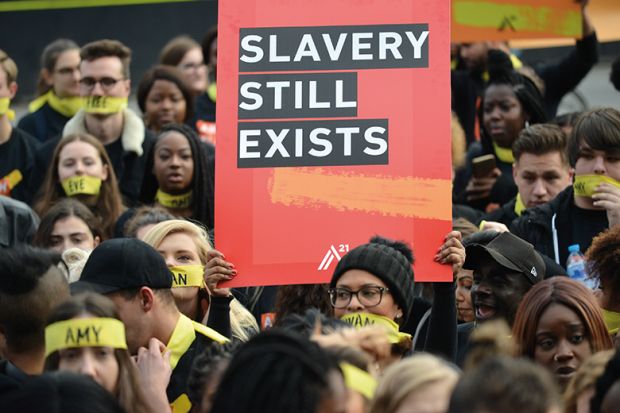At the end of the past century, Kevin Bales published Disposable People: New Slavery in the Global Economy (1999), which argued that 27 million people were enslaved globally. The book became a cause célèbre, and very soon Western nations no longer presumed that slavery had been abolished in 1865. Laura Murphy’s The New Slave Narrative includes more than 40 testimonies that have been published, often in multiple translations, in the wake of Bales’ study. In the past two decades, former slaves have become media stars, appearing on The Oprah Winfrey Show and sometimes even invited to the White House. The film, television and publishing industries have taken up their books – with some individuals, such as Francis Bok (Escape from Slavery, 2003) and Mende Nazer (Slave: My True Story, 2003), becoming iconic.
Yet as Murphy’s subtitle – “The Battle over Representations” – indicates, the new slave narrative is not straightforward. Bok, for instance, was lauded by President George W. Bush at a time when his government was cutting funds to combat exploitative labour practices in the US. Along with Bok, Nazer was enslaved in Sudan, which meant that Christian anti-Muslim groups could appropriate their testimonies to argue that African slavery is inherently Islamic. In evoking 19th-century abolitionists, such as Frederick Douglass and Harriet Tubman, Murphy warns against ex-slaves today being used as “blackface abolitionists”, unwittingly co-opted by Western organisations.
Contemporary slavery is no longer solely a product of racism, nor is it located in specific colonies or colonial practices. Murphy, who is also an anti-slavery activist, initially found descriptions of people “forced to pick cotton in Uzbekistan, mine minerals and gems in Tanzania, and stitch clothes in Chinese prison labour camps”. But how is it possible to account for these experiences without conforming to the expectations of a Western readership? This question is compounded when we note that the vast majority of ex-slaves need an “amanuensis” (a ghost writer, editor, publisher, translator) to make their testimonies “legible”.
A great strength of this book is that it recognises that there is no such thing as an unmediated account of slavery. To access the “truth”, one has to understand what it means for these former slaves to “write themselves into existence”. Murphy rightly considers the slave genre as clouding perceptions through reinforcing 19th-century assumptions about personal growth through suffering that leaves the past behind. Virtually all “new slavery” titles include phrases such as “reclaiming my life”, “my journey to freedom” or “from slave child to abolitionist”, which promote (through the book’s marketing) a redemptive or “not-yet-freedom” narrative. The cost of being co-opted comes in an opposition between slavery and civilisation, as if the Western consumer does not benefit from forced labour.
It is a pity that Murphy is so deeply suspicious of merely interpreting these texts in a scholarly or detached manner. Her goal is to understand these new testimonies not as survivor literature but as protest literature, so that they, and their authors, can be placed at the heart of campaigns to abolish global slavery. Only a “collegial” or collective readership, devoid of academic scepticism, will enable the individual reader to move from mere empathy to “megaphone” activism. This means reading partially, just for those elements that can aid the activist and help to end slavery. Such didacticism is the weakest feature of the book and reduces the topic rather than enhances it collegially. But this is the first study of its kind and will surely inspire many more works.
Bryan Cheyette is professor of modern literature and culture at the University of Reading. His short book on The Ghetto will be published by Oxford University Press next year.
The New Slave Narrative: The Battle over Representations of Contemporary Slavery
By Laura T. Murphy
Columbia University Press, 320pp, £70.00 and £24.00
ISBN 9780231188241 and 9780231188258
Published 17 September 2019
Register to continue
Why register?
- Registration is free and only takes a moment
- Once registered, you can read 3 articles a month
- Sign up for our newsletter
Subscribe
Or subscribe for unlimited access to:
- Unlimited access to news, views, insights & reviews
- Digital editions
- Digital access to THE’s university and college rankings analysis
Already registered or a current subscriber?







